英语听课记录模板
小学英语听课记录【三篇】
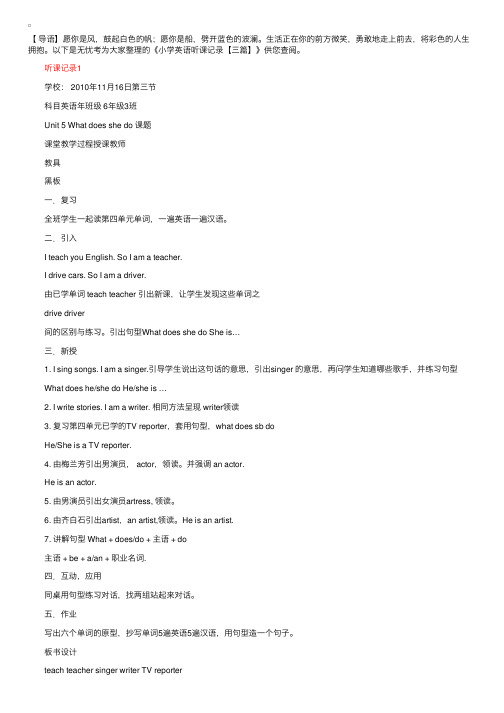
【导语】愿你是风,⿎起⽩⾊的帆;愿你是船,劈开蓝⾊的波澜。
⽣活正在你的前⽅微笑,勇敢地⾛上前去,将彩⾊的⼈⽣拥抱。
以下是⽆忧考为⼤家整理的《⼩学英语听课记录【三篇】》供您查阅。
听课记录1 学校: 2010年11⽉16⽇第三节 科⽬英语年班级 6年级3班 Unit 5 What does she do 课题 课堂教学过程授课教师 教具 ⿊板 ⼀.复习 全班学⽣⼀起读第四单元单词,⼀遍英语⼀遍汉语。
⼆.引⼊ I teach you English. So I am a teacher. I drive cars. So I am a driver. 由已学单词 teach teacher 引出新课,让学⽣发现这些单词之 drive driver 间的区别与练习。
引出句型What does she do She is… 三.新授 1. I sing songs. I am a singer.引导学⽣说出这句话的意思,引出singer 的意思,再问学⽣知道哪些歌⼿,并练习句型 What does he/she do He/she is … 2. I write stories. I am a writer. 相同⽅法呈现 writer领读 3. 复习第四单元已学的TV reporter,套⽤句型,what does sb do He/She is a TV reporter. 4. 由梅兰芳引出男演员, actor,领读。
并强调 an actor. He is an actor. 5. 由男演员引出⼥演员artress, 领读。
6. 由齐⽩⽯引出artist,an artist,领读。
He is an artist. 7. 讲解句型 What + does/do + 主语 + do 主语 + be + a/an + 职业名词. 四.互动,应⽤ 同桌⽤句型练习对话,找两组站起来对话。
五.作业 写出六个单词的原型,抄写单词5遍英语5遍汉语,⽤句型造⼀个句⼦。
小学英语听课记录10篇

Jump like a squirrel
2.领读
3.听录音
4.学生自己大声读,不会的问老师。
4.互动,应用
1.边做动作边读。
2.拿出单词卡片分给学生,做游戏。
老师念卡片上的单词,拿到的同学站起来并大声读出来。
3.I m Zoom. What'your n ame?
Follow me!
4.
由梅兰芳引出男演员,actor,领读。并强调
an actor.
He is an actor.
5.
由男演员引出女演员artress,领读。
6.
由齐白石引出artist,an artist,领读。He is an artist.
7.
讲解句型What+does/do+
主语+do?
主语+be+a/an+职业名词.
What would you like?引出单词。
2.Hale Waihona Puke 单词抢答老师出示卡片,
学生抢读,先读出来的得到卡片。
3.
板书rice. Can lhave some rice, please?
然后问答练习,
前后桌一问一答,顺序进行。
4.
边做动作边读,
弓丨出no odles
5.
教师拼读,学生猜出单词beef.
6.
sin ger的意思,
再问学生知道哪些歌手,并练习句型
What does he/she do? He/she is…
2.
I write stories. I am a writer.
相同方法呈现writer领读
3.
PEP人教版小学英语听课记录10篇
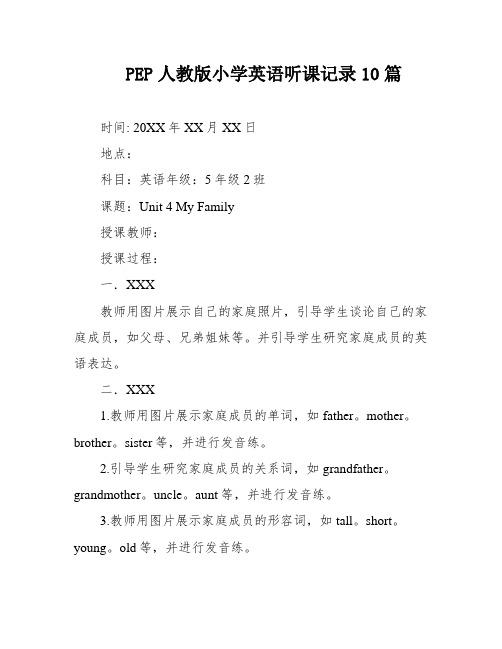
PEP人教版小学英语听课记录10篇时间: 20XX年XX月XX日地点:科目:英语年级:5年级2班课题:Unit 4 My Family授课教师:授课过程:一.XXX教师用图片展示自己的家庭照片,引导学生谈论自己的家庭成员,如父母、兄弟姐妹等。
并引导学生研究家庭成员的英语表达。
二.XXX1.教师用图片展示家庭成员的单词,如father。
mother。
brother。
sister等,并进行发音练。
2.引导学生研究家庭成员的关系词,如grandfather。
grandmother。
uncle。
aunt等,并进行发音练。
3.教师用图片展示家庭成员的形容词,如tall。
short。
young。
old等,并进行发音练。
4.教师用图片展示家庭成员的职业,如teacher。
doctor。
engineer等,并进行发音练。
三.XXX1.教师用图片展示家庭成员的照片,让学生用英语介绍这些人物。
例如,XXX.2.学生分组进行家庭成员介绍比赛,每组介绍完后其他组进行评分。
四.Homework1.完成课本上的练题。
2.写一篇介绍自己家庭成员的短文,使用所学单词和句型。
板书设计Family XXX: father。
XXX。
brother。
sister。
XXX。
grandmother。
uncle。
auntAdjectives: tall。
short。
young。
oldns: XXX。
doctor。
engineerXXX: XXX.时间: 20XX年XX月XX日地点:XXX科目:英语年级:6年级3班课题:Unit 5 What does she do?授课教师:(姓名)授课过程:一.Review老师拿出卡片,让学生复已学动物的名称,并拼读。
二.XXX老师板书mouse。
XXX。
bear。
bird。
squirrel,领读并让学生说出汉语意思。
三.XXX1.老师示范动作,让学生模仿,如:Hunt like a mouse。
Walk like an elephant。
完整word版)小学英语听课记录10篇
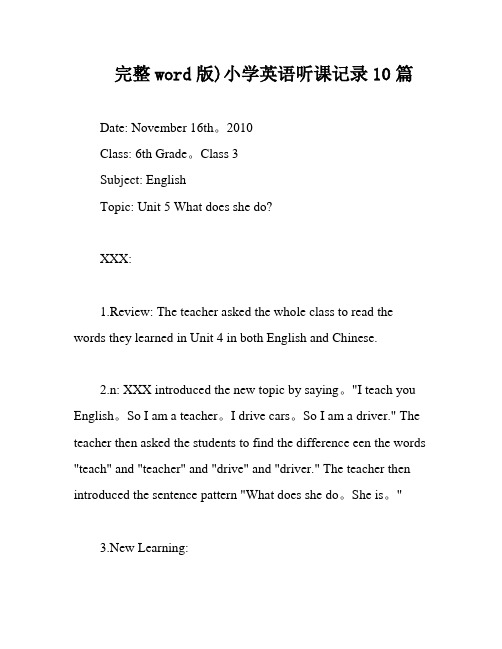
完整word版)小学英语听课记录10篇Date: November 16th。
2010Class: 6th Grade。
Class 3Subject: EnglishTopic: Unit 5 What does she do?XXX:1.Review: The teacher asked the whole class to read the words they learned in Unit 4 in both English and Chinese.2.n: XXX introduced the new topic by saying。
"I teach you English。
So I am a teacher。
I drive cars。
So I am a driver." The teacher then asked the students to find the difference een the words "teach" and "teacher" and "drive" and "driver." The teacher then introduced the sentence pattern "What does she do。
She is。
"3.New Learning:a。
"I sing songs。
I am a singer." The teacher asked the students to XXX word "singer." The teacher then asked the students if they XXX pattern "What does he/she do。
He/she is。
小学英语听课记录(通用6篇)

小学英语听课记录(通用6篇)在教学中,要把导读作为理解课文的主要手段,贯穿于整个教学过程。
以下是为大家整理的关于小学英语听课记录的文章6篇 ,欢迎品鉴!小学英语听课记录篇1 《小学英语对话教学的研究》实验课题实验课听课记录2022年11月21日T:现在老师想问问大家,Whatdoyoulike?你们最喜欢吃什么?T:大家猜猜老师最喜欢什么?T:Ilikehamburgers.T:说到这里,老师都要流口水了。
不过,我们的另外两个好朋友Mike和Sarah 已经迫不及待地要大吃一顿了.出示课件:(A部分的Let`stalk)第一组对话:Ilikehamburgers.Ilikehotdogs.T:Mike喜欢吃 Sarah喜欢吃 Whataboutyou?T:OK,now,readafterit.(读两遍)自主练习。
T:Whatdoyoulike?你喜欢吃什么?指名同学回答。
T:Continue.继续看。
第二组对话:Hereyouare.Hotdogsandhamburgers.T:好了,香喷喷的汉堡包和热狗终于来了,让我们再一次看看服务员阿姨是怎么说的?T:Whocaeadit?Haveatry!T:Ok,让我们一起读。
T:老师也很喜欢.Hotdogsandhamburgers.不过,Mike非常能吃,他觉得汉堡包和热狗还不够,我们看看,他又点了些什么?出示第三组对话:IlikeFrenchfries.Metoo.T:Ok,nowwhocaeadit?Haveatry!找学生试读,教师加以纠正。
T:哪一组愿意读给大家听一听。
Haveatry!找两组同学试读。
T:Ilikehamburgers.如果你也喜欢hamburgers,用同样的方法操练chicken、bread、cake、hotdogs.出示第四组对话:Ok,havesomeFrenchfries.Thankyou.T:好了,现在我们可以张开大嘴,开吃了。
PEP人教版小学英语听课记录10篇

小学英语听课记录101听课记录1学校:XXX小学时间:20XX年XX月XX日地点:科目:英语年级:6年级3班课题:Unit 5 What does she do?授课教师:授课过程:一. Review全班学生一起读第四单元单词,一遍英语一遍汉语。
二. Lead-inI teach you English. So I am a teacher.I drive cars. So I am a driver.由已学单词teach teacher引出新课,让学生发现这些单词之drive driver间的区别与练习。
引出句型与at does she do? She is…三. Presentation1. I sing songs. I am a singer.引导学生说出这句话的意思,引出singer的意思,再问学生知道哪些歌手,并练习句型What does he/she do? He/sheis …2. I write stories. I am a writer.相同方法呈现writer 领读3. Review 第四单元已学的TV reporter,套用句型,what does she do?He/She is a TV reporter.4.由梅兰芳引出男演员actor,领读。
并强调an actor.He is an actor.5.由男演员引出女演员actress,领读。
6.由齐白石引出artist, an artist,领读。
He is an artist.7.讲解句型What + does/do + 主语 + do?主语+ be + a/an +职业名词.四. Practice and Consolidation同桌用句型练习对话,最好找两组站起来对话。
五. Homework写出六个单词的原型,抄写单词5遍英语5遍汉语,用句型造一个句子。
板书设计teach teacher singer writer TV reporter drive driver write writer actor actress artist What + does/do + 主语 + do? 主语+ be + a/an +职业名词.听课记录2学校:XXX小学时间:20XX年XX月XX日地点:科目:英语年级:6年级3班课题:Unit 5 What does she do?授课教师:授课过程:一.Review拿出卡片让学生Review已学动物的名称,并拼读。
小学英语听课记录10篇
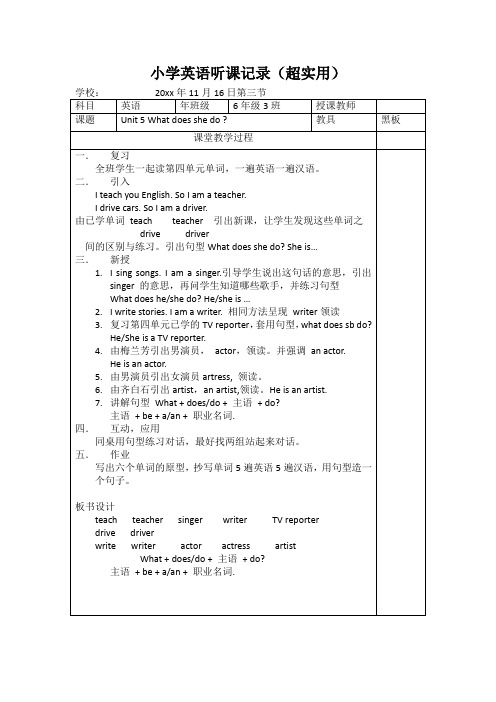
写出六个单词的原型,抄写单词5遍英语5遍汉语,用句型造一个inger writer TV reporter
drive driver
write writer actor actress artist
What + does/do +主语+ do?
主语+ be + a/an +职业名词.
做游戏“下一个数字”引出Unit5。老师说前一个数字,学生说下一个。听录音,Let’s chant,复习三年级所学的食物名称。
七.新授
5.由句型Do you like…?
What would you like?引出单词。
6.单词抢答
老师出示卡片,学生抢读,先读出来的得到卡片。
7.板书rice. Can Ihave some rice, please?
I drive cars. So I am a driver.
由已学单词teach teacher引出新课,让学生发现这些单词之
drive driver
间的区别与练习。引出句型What does she do? She is…
三.新授
1.I sing songs. I am a singer.引导学生说出这句话的意思,引出singer的意思,再问学生知道哪些歌手,并练习句型
老师念卡片上的单词,拿到的同学站起来并大声读出来。
3.I’m Zoom. What’s your name?
Follow me!
新授story time.与学生互动,让学生扮演Zoom.找朋友,循环练习。
五.作业
根据story time进行角色扮演。
板书设计
Hunt like a mouse
高中英语听课记录30篇
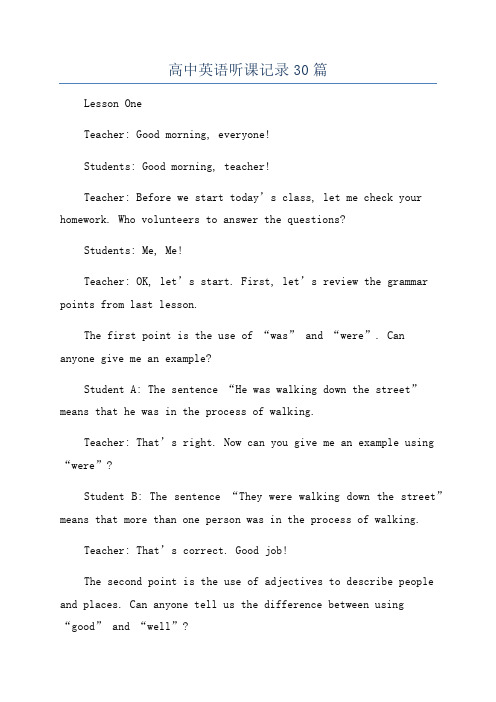
高中英语听课记录30篇Lesson OneTeacher: Good morning, everyone!Students: Good morning, teacher!Teacher: Before we start today’s class, let me check your homework. Who volunteers to answer the questions?Students: Me, Me!Teacher: OK, let’s start. First, let’s review the grammar points from last lesson.The first point is the use of “was” and “were”. Can anyone give me an example?Student A: The sentence “He was walking down the street” means that he was in the process of walking.Teacher: That’s right. Now can you give me an example using “were”?Student B: The sentence “They were walking down the street” means that more than one person was in the process of walking.Teacher: That’s correct. Good job!The second point is the use of adjectives to describe people and places. Can anyone tell us the difference between using “good” and “well”?Student C: The word “good” is used to describe things that we think are positive, while the word “well” describes how something is functioning.Teacher: Excellent! Now let’s mov e on to the main topic of today’s lesson: shopping.Students: * Excited murmur *Teacher: Before we talk about shopping, I want you all to think of the different phrases and adjectives associated with shopping.Student D: Shopping can be fun, exciting, expensive, and tiring.Teacher: Yes, that’s right. Now let’s talk about the different types of shopping that people do. What are some examples?Students: Grocery shopping, clothes shopping, online shopping, window shopping.Teacher: Good job! Now let’s talk a bout the benefits and drawbacks of different types of shopping.Lesson TwoTeacher: Good morning, class!Students: Good morning, teacher!Students: Yes!Teacher: Great! Today we will be talking about the differences between formal and informal speech. Can anyone tell me what the difference is?Teacher: Correct! Now, I want you all to think of some examples of formal and informal speech.Student B: Formal speech: “Would you please pass me the salt?”Informal: “Can you pass me the salt?”Teacher: Excellent! Now let’s move on to the various types of conversations we have in English. For example, when talkingto someone you don’t know, how would you begin the conversation?Student C: It would depend on the situation. If I were in a formal situation, I would say, “Good evening, how may I help you?” If I were in an informal situation, I would say, “Hi, what’s up?”Teacher: Wow, very good! Now, we can also change our tone and style of speech depending on the situation. Can anyone give me an example?Student D: Yes. If I were talking to a friend, I would use informal language, but if I were talking to a professor, I would use formal language.Teacher: Perfect! Now let’s move on to some practice exercises.Lesson ThreeTeacher: Good morning, class.Students: Good morning, teacher!Teacher: I hope you all had a good break. Today we will be talking about idioms and expressions. First, can anyone give me an example of an idiom?Student A: Sure. One example is “it’s raining cats and dogs”, which means it is raining heavily.Teacher: That’s right. Now, can anyone tell me the difference between an idiom and an expression?Student B: An idiom is a phrase or expression that has a meaning that is different from the literal words that make up the phrase. An expression is a phrase or sentence that conveys an idea.。
英语听课记录范文(实用6篇)
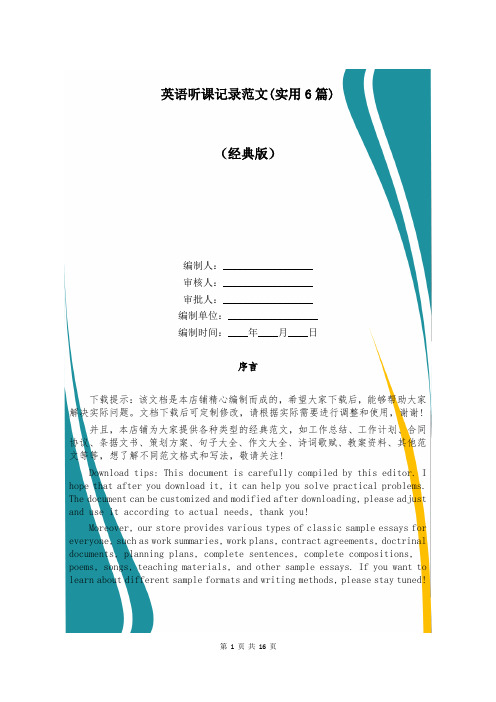
英语听课记录范文(实用6篇)(经典版)编制人:__________________审核人:__________________审批人:__________________编制单位:__________________编制时间:____年____月____日序言下载提示:该文档是本店铺精心编制而成的,希望大家下载后,能够帮助大家解决实际问题。
文档下载后可定制修改,请根据实际需要进行调整和使用,谢谢!并且,本店铺为大家提供各种类型的经典范文,如工作总结、工作计划、合同协议、条据文书、策划方案、句子大全、作文大全、诗词歌赋、教案资料、其他范文等等,想了解不同范文格式和写法,敬请关注!Download tips: This document is carefully compiled by this editor. I hope that after you download it, it can help you solve practical problems. The document can be customized and modified after downloading, please adjust and use it according to actual needs, thank you!Moreover, our store provides various types of classic sample essays for everyone, such as work summaries, work plans, contract agreements, doctrinal documents, planning plans, complete sentences, complete compositions, poems, songs, teaching materials, and other sample essays. If you want to learn about different sample formats and writing methods, please stay tuned!英语听课记录范文(实用6篇)英语听课记录范文第1篇五彩缤纷丰收11、秋天的雨香甜好闻(钥匙)传递信息欢乐听课评析这堂课的板书简明扼要地反映了课文的主要资料,脉络清楚,丰收和欢乐两个词语点明了课文的中心,深化了文章的主题。
小学英语听课记录10篇

小学英语听课记录10篇Date: November 16th。
2010Class: 6th grade。
Class 3Subject: EnglishTopic: Unit 5 - What Does She Do?Teaching Process:1.Review:The teacher asked the whole class to read the words from Unit 4.in both English and Chinese.2.n:The teacher introduced the new topic by saying "I teach you English。
So I am a teacher。
I drive cars。
So I am a driver." The teacher then asked the students to find the difference een the words "teach" and "teacher" and "drive" and "driver"。
This led to the n of the sentence pattern "What does she do。
She is…"3.New Content:a。
"I sing songs。
I am a singer." The teacher asked the students to guess the meaning of the sentence and introduced the word "singer"。
The teacher then asked the students if they knew any singers and practiced the sentence pattern "What does he/she do。
英语听课记录及评析范文5篇

英语听课记录及评析范文5篇1. Today's lecture was about the impacts of climate change on the global environment. The professor discussed the rise in global temperatures and the resulting effects on weather patterns, sea levels, and ecosystems. He also emphasized the importance of reducing carbon emissions and transitioning to renewable energy sources. Overall, the lecture was informative and timely, given the current state of our planet's environment.2. The lecture focused on the concept of cultural relativism and its implications for understanding different societies and their customs. The professor highlighted the importance of suspending judgment and viewing each culture within its own context. He also discussed the challenges of balancing cultural relativism with universal human rights. It was a thought-provoking lecture that encouraged us toreconsider our preconceived notions about cultures different from our own.3. During today's class, the topic was the French Revolution and its impact on modern politics and society. The professor emphasized the role of Enlightenment ideas infueling the revolutionary fervor and the subsequent rise of democratic principles. He also discussed the legacy of the revolution in shaping France and the rest of Europe. It wasan engaging lecture that shed light on the lastingsignificance of this pivotal historical event.4. The lecture today was on the principles of microeconomics, specifically the concept of supply and demand. The professor used real-world examples to illustrate how changes in supply and demand affect prices and market equilibrium. He also discussed the factors that can shift the supply and demand curves. Overall, the lecture provided asolid foundation for understanding the basics of microeconomics.5. Today's lecture delved into the topic of human resource management within organizations. The professor discussed various strategies for recruiting, training, and retaining employees, as well as the importance of creating a positive work culture. He also addressed the challenges of managing a diverse workforce and the role of HR in addressing workplace conflicts. It was a practical and insightfullecture that highlighted the critical role of HR in organizational success.。
小学英语听课记录10篇

如果您需要使用本文档,请点击下载按钮下载!小学英语听课记录(超实用)学校:2010 年11 月16 日第三节科目英语年班级 6 年级3 班授课教师课题Unit 5 What does she do ?课堂教学过程教具黑板一.复习全班学生一起读第四单元单词,一遍英语一遍汉语。
二.引入I teach you English. So I am a teacher.I drive cars. So I am a driver.由已学单词teach teacher 引出新课,让学生发现这些单词之drive driver间的区别与练习。
引出句型What does she do? She is三.新授1.I sing songs. I am a singer.引导学生说出这句话的意思,引出singer 的意思,再问学生知道哪些歌手,并练习句型What does he/she do? He/she is2.I write stories. I am a writer. 相同方法呈现writer 领读3.复习第四单元已学的TV reporter,套用句型,what does sb do?He/She is a TV reporter.4.由梅兰芳引出男演员,actor,领读。
并强调an actor.He is an actor.5.由男演员引出女演员artress, 领读。
6.由齐白石引出artist ,an artist,领读。
He is an artist.7.讲解句型What + does/do + 主语+ do?主语+ be + a/an + 职业名词.四.互动,应用同桌用句型练习对话,最好找两组站起来对话。
五.作业写出六个单词的原型,抄写单词5 遍英语5 遍汉语,用句型造一个句子。
板书设计teach teacher singer writerdrive write driverwriter actor actress What + does/do + 主语+ do?主语+ be + a/an + 职业名词. TV reporter artist学校:2010 年11 月16 日第五节科目英语年班级 3 年级2 班授课教师课题Unit 4 We love animals. 教具黑板卡片录音机课堂教学过程一.复习拿出卡片让学生复习已学动物的名称,并拼读。
英文听课记录表
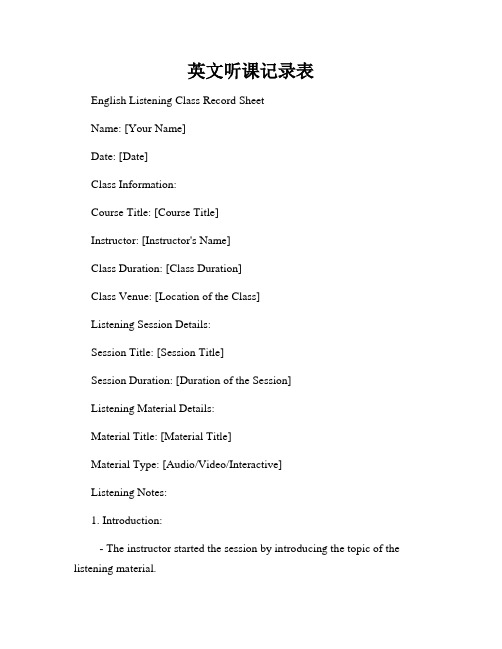
英文听课记录表English Listening Class Record SheetName: [Your Name]Date: [Date]Class Information:Course Title: [Course Title]Instructor: [Instructor's Name]Class Duration: [Class Duration]Class Venue: [Location of the Class]Listening Session Details:Session Title: [Session Title]Session Duration: [Duration of the Session]Listening Material Details:Material Title: [Material Title]Material Type: [Audio/Video/Interactive]Listening Notes:1. Introduction:- The instructor started the session by introducing the topic of the listening material.- Purpose of the listening activity was explained to the students.2. Pre-listening Activities:- The instructor provided pre-listening activities to activate the students' prior knowledge and set the context for comprehension.- The students were encouraged to brainstorm ideas related to the topic of the listening material.- Vocabulary words related to the listening material were discussed.3. Listening Comprehension:- The listening material was played for the students.- Students were instructed to actively listen and take notes during the listening activity.4. Post-listening Activities:- After the listening activity, the instructor facilitated a class discussion to check the students' understanding and elicit their thoughts.- Additional comprehension questions were provided to encourage critical thinking.- The instructor provided feedback and clarification on any challenging points.5. Language Focus:- The instructor focused on language skills development related to the listening material.- Grammar, vocabulary, and pronunciation exercises were conducted to reinforce language learning.6. Reflection and Conclusion:- The students were given time for self-reflection on their listening skills improvement.- The instructor summarized the key points covered during the session and concluded the class.Additional Notes:- The instructor used visual aids and gestures to support understanding during the listening activity.- The listening material had a variety of voices and accents to expose the students to different English language variations.- The instructor encouraged active participation and provided opportunities for students to share their thoughts and questions.Overall, the listening class was well-structured and engaging. The instructor effectively utilized different teaching strategies to enhance students' listening skills and comprehension abilities.End of Class Record.Note: This is a sample record sheet for an English listening class. Please adapt the format and content according to your specific requirements and guidelines.。
大学英语听课记录(共5篇)
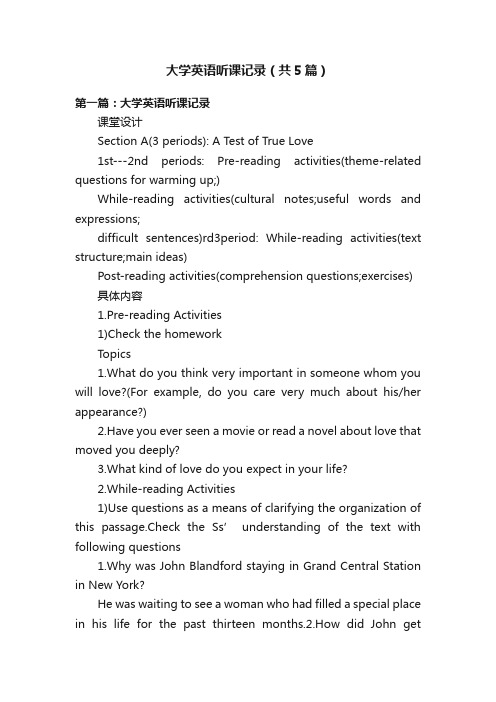
大学英语听课记录(共5篇)第一篇:大学英语听课记录课堂设计Section A(3 periods): A Test of True Love1st---2nd periods: Pre-reading activities(theme-related questions for warming up;)While-reading activities(cultural notes;useful words and expressions;difficult sentences)rd3period: While-reading activities(text structure;main ideas)Post-reading activities(comprehension questions;exercises) 具体内容1.Pre-reading Activities1)Check the homeworkTopics1.What do you think very important in someone whom you will love?(For example, do you care very much about his/her appearance?)2.Have you ever seen a movie or read a novel about love that moved you deeply?3.What kind of love do you expect in your life?2.While-reading Activities1)Use questions as a means of clarifying the organization of this passage.Check the Ss’ understanding of the text with following questions1.Why was John Blandford staying in Grand Central Station in New York?He was waiting to see a woman who had filled a special place in his life for the past thirteen months.2.How did John getconnected to the woman?3.How was John’s first response to the woman different from that of his friends?4.What had the woman, Hollis Meynell, done in the past thirteen months?She had faithfully written to John.Even when his letters did not arrive, she wrote anyway, without decrease.5.How did he feel as long as he received her letters?6.When he asked her for a photo, what did she do?7.Did Hollis Meynell come to the station as they had arranged?Yes, but she had asked a lady well over forty to wear the rose on her coat.8.Why did Hollis Meynell want to test John Blandford?2)Language Points:1.without fail:(Line 6)① when you tell sb to do sth without fail, you are telling them that they must do it;with complete certainty 务必,一定② always 总是,必定I want you here by two o’clock without fail.我要你两点钟务必来到这里。
听课记录英语(推荐6篇)

听课记录英语(推荐6篇)听课记录英语第1篇学生对知识的掌握较好,从中可看出热爱上了这门功课,大多同学能围绕教师的提问动脑思考。
授课形式多样,通过讲授讨论朗读等方式,达到了示范课的目的。
教师能在组织旧知识的基础上讲新课,且从旧知到新知的过渡自然,学生积极性也高。
教师能很有耐心地进行个别指导,很有亲和力。
但示范效果不好,其实在这里分组学习会更好。
课前准备充分,充分利用了多媒体教学,为学生创造了良好的语言学习情境,激发了学生的学习热情,调动了学生的学习积极性。
3月6日听了邵XX老师的《美好人生我选择》——直面升学与择业,认为本节课学习内容是与学生生活、学习紧密结合、息息相关的课题,教师授课中有针对性地探讨了学生面临的问题及相应对策,教学中能密切结合校园内及学生身边熟悉的事件开展教学,深入浅出,启发学生进行思考,开展讨论。
教师语言表述清晰、精要、幽默。
建议教师要对学生的分析、提炼、总结问题的能力加强培养,提高要求。
3月8日听了陈XX老师的一堂课,认为本节语法课内容紧扣知识要点,所选内容突出了重点、难点,加深了学生的体会,便于学生理解。
教师语法授课中讲解能注意引导、启发。
在课堂中学生朗读能力培养还略显欠缺,各环节紧凑性还可加强,老师对学生纪律要提高要求。
3月8日听了秦XX老师的《透镜光的折射》一课,认为教师语言表述能力好,课堂讲解层次清晰,注重启发、拓展,教师的基本功扎实,讲解中注重知识的记忆、整理,结合习题在授课中及时巩固,并做到精批精讲,板书相当清晰、规范。
但做为复习课,对学生能力要求可再提高一些,课堂上可适当给予学生互动的空间。
教学重难点突出,板书清晰有条理。
教学步骤设计合理,由浅入深,循序渐进。
教师基本功扎实,知识讲解准确,教学设计合理,始终以学生为主体,自主学习,小组交流讨论,上台交流展示等形式,师生配合默契,取得了较好的学习效果。
听课记录英语第2篇根据四年级学生好奇心浓厚的特点,并根据小学英语中要注意培养学生发散性思维能力,认真观察,注意倾听并能用英语进行简单交流的目的,联系本课特点,从培养的语言能力入手,通过各种方式,运用学生身边的事物,合理地运用语言材料,培养学生的思维与使用英语的能力。
2016小学英语听课记录20篇
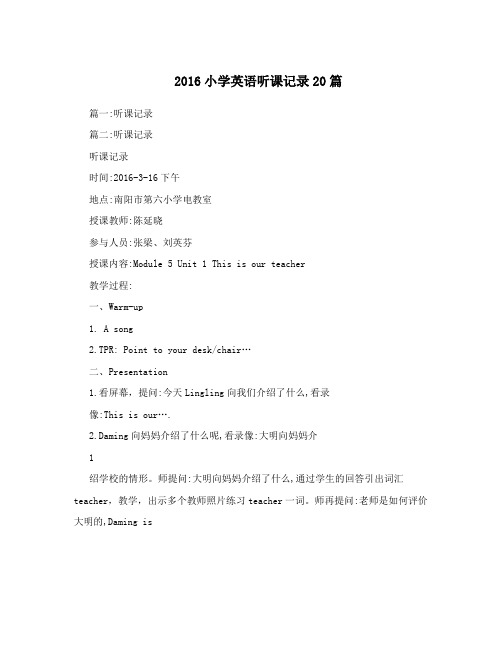
2016小学英语听课记录20篇篇一:听课记录篇二:听课记录听课记录时间:2016-3-16下午地点:南阳市第六小学电教室授课教师:陈延晓参与人员:张梁、刘英芬授课内容:Module 5 Unit 1 This is our teacher教学过程:一、Warm-up1. A song2.TPR: Point to your desk/chair…二、Presentation1.看屏幕,提问:今天Lingling向我们介绍了什么,看录像:This is our….2.Daming向妈妈介绍了什么呢,看录像:大明向妈妈介1绍学校的情形。
师提问:大明向妈妈介绍了什么,通过学生的回答引出词汇teacher,教学,出示多个教师照片练习teacher一词。
师再提问:老师是如何评价大明的,Daming isa good child.引出词汇child,教学新词。
(teacher一词的练习方式值得学习,不是单纯地领读单词,而是用多个老师的照片来练习,实际上是一种简单的应用练习)3.Listen, point and find “This is …”(课本第26页)让学生上讲台上的电子白板上圈(电子白板很实用,什么时候莱西能够普及,期待~)4.Listen, point and repeat.教师点白板,播放录音,学生模仿跟读。
跟两遍。
(第一遍后有评价和对第二遍的要求,很好的做法。
)5.小结:师提问:刚才大明是怎样介绍自己的学校的,小组讨论一下。
生:This is our classroom.教师在电子白板上出示This is our classroom.及相应的图画,红色标出This is。
T:Let’s go on.出示And this is our teacher, Ms. Smart.重点标出our。
This is my desk.重点标出my.(用红色标出重点词句,能够引起学生的注意,很好的做法。
)三、Consolidation1.教师让学生看黑板,把刚才板书的内容领读一遍。
英语听课记录及评析范文5篇

英语听课记录及评析范文5篇英语课程的学习其实考的更多的就是单词的记忆和句型的变换,很多英语老师的上课方式或许是有好的地方,但是这不好的地方也是有的,就看看听课的老师是怎么说的吧。
英语听课记录及评析1听课人:xx授课教师李xx授课班级高一(1)班教学内容:unit 4 earthquakes period 4 listening课堂记录step 1 revision1. check the homework exercises.2. ask some students to make sentences with attributive clauses.step 2 warming uptell the students: as we all know, earthquakes are disasters to everyone. but why do earthquakes happen? can we avoid or at least reduce the losscaused by earthquakes? can we foretell earthquakes? now we will do some listening and the listening text will tell us the answers.step 3 listening (on page 62 in the workbook)1. look through the part listening on page 62 and guess what the listening material may be about. then listen to the tape for the first time to see whether their guessing is right or not.2. read the following statements and listen to the tape for the second time. then decide whether they are true or false.check the answers and try to correct the statements which are false.3. listen to the tape again and then answer the questions and complete the following sentences.part 1:1)why do earthquakes happen?2)why do california, china and japan have a lot of earthquakes?part 2:1)do not built______________.2)make sure youbuild______________.3)youmust______________._____________ buildings will fall downand_____________ onesmay______________.a few minutes later, check the answers with the whole class.4. discuss this question in small groups: why do some earthquakes kill more people than others?5. reading and retellingshow the students the listening text and let them read it. then ask them to retell the cause of earthquakes and the ways of reducing losses from earthquakes.step 4 listening task(on page 66 in the workbook)turn to page 66. look at the pictures and discuss what the might have learned.1. in four let the students discuss what would be the best way to protect oneself if there was an earthquake.2. ask one member of the group to give their ideas to the class.3. let the class 出现恶意脚本uate each groups idea and see if they agree. if they do, write the idea on the board. collect the ideas all the groups have contributed.4. ask the students to choose the three that they think are the most useful if an earthquake comes.5. listen to the tape for the first time and see if the ideas on the tape are the same. discuss why the plans on the tape are different from the onessuggested by the class.6. now make the earthquake plan. then listen to the tape for the second time to improve the earthquake plan.step 5 listening(on page 31 in using language)1. tell the students: we are going to listen to a story told by a man who was a survivor of the great san francisco earthquake of 1906.2. go through the sentences in exercise 2, then listen to the tape for the first time, and try to tell whether the statements are true or false.3. go through the questions in exercise 3, then listen to the tape for the second time and answer the questions.4. tell the students: while listening to the tape, you should not only pay attention to the contents, but also the pronunciation and intonation.5. reading and retellingshow the students the listening text and let them read it. then ask them to retell it. step 6 homework1. finish off the workbook exercises.2. read the listening texts again and try to retell them.听课评析本堂课是该单元教学的第四部分听力教学。
英语听课记录5篇
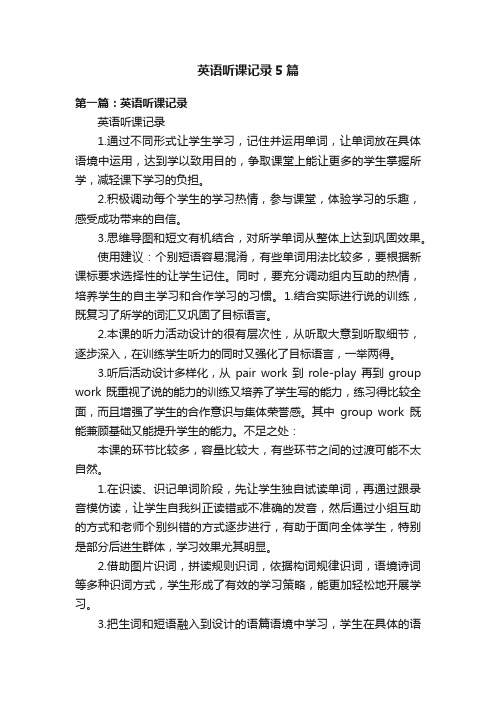
英语听课记录5篇第一篇:英语听课记录英语听课记录1.通过不同形式让学生学习,记住并运用单词,让单词放在具体语境中运用,达到学以致用目的,争取课堂上能让更多的学生掌握所学,减轻课下学习的负担。
2.积极调动每个学生的学习热情,参与课堂,体验学习的乐趣,感受成功带来的自信。
3.思维导图和短文有机结合,对所学单词从整体上达到巩固效果。
使用建议:个别短语容易混淆,有些单词用法比较多,要根据新课标要求选择性的让学生记住。
同时,要充分调动组内互助的热情,培养学生的自主学习和合作学习的习惯。
1.结合实际进行说的训练,既复习了所学的词汇又巩固了目标语言。
2.本课的听力活动设计的很有层次性,从听取大意到听取细节,逐步深入,在训练学生听力的同时又强化了目标语言,一举两得。
3.听后活动设计多样化,从pair work到role-play 再到group work既重视了说的能力的训练又培养了学生写的能力,练习得比较全面,而且增强了学生的合作意识与集体荣誉感。
其中group work既能兼顾基础又能提升学生的能力。
不足之处:本课的环节比较多,容量比较大,有些环节之间的过渡可能不太自然。
1.在识读、识记单词阶段,先让学生独自试读单词,再通过跟录音模仿读,让学生自我纠正读错或不准确的发音,然后通过小组互助的方式和老师个别纠错的方式逐步进行,有助于面向全体学生,特别是部分后进生群体,学习效果尤其明显。
2.借助图片识词,拼读规则识词,依据构词规律识词,语境诗词等多种识词方式,学生形成了有效的学习策略,能更加轻松地开展学习。
3.把生词和短语融入到设计的语篇语境中学习,学生在具体的语境中加强了对单词的理解记忆。
借助思维导图的帮助复述短文,思路清晰条例,降低了难度,增强了学生的自信心。
使用注意事项:1.本节课的容量较大,因此课前要让学生做好提前预习工作。
2.所涉及的每个环节,要以多媒体直观呈现的形式逐一展示给学生,这样才能高效率、高质量地完成学习任务。
英语听课记录及评析范文5篇

英语听课记录及评析范文5篇Yesterday, I attended an English listening class. The teacher played several audio clips of different English accents and dialects for us to practice listening comprehension. I found it challenging to understand some of the accents, especially the British and Australian ones. However, I enjoyed the diversity of voices and learned how to adapt my listening skills to different speech patterns.昨天,我参加了一堂英语听课。
老师为我们播放了几个不同英语口音和方言的音频片段,让我们练习听力理解。
我发现有些口音很难理解,尤其是英国和澳大利亚口音。
但是,我喜欢多样的声音,学会了如何适应不同的语音模式。
In addition to the accent challenge, the class also focused on listening to various types of English speech, such as formal presentations, casual conversations, and interviews. It was eye-opening to hear the different tones, pacing, and vocabulary used in each context. I realized the importance of being able to comprehend and interpret different styles of English communication in real-world situations.除了口音挑战,课堂还专注于听不同类型的英语演讲,比如正式演讲、随意谈话和采访。
- 1、下载文档前请自行甄别文档内容的完整性,平台不提供额外的编辑、内容补充、找答案等附加服务。
- 2、"仅部分预览"的文档,不可在线预览部分如存在完整性等问题,可反馈申请退款(可完整预览的文档不适用该条件!)。
- 3、如文档侵犯您的权益,请联系客服反馈,我们会尽快为您处理(人工客服工作时间:9:00-18:30)。
听课记录一:Lesson type: GrammarTeaching objectives: By the end of the lesson, most of the students will be able to…1. Language skills:read the passage and fill in the blanks with modal verbs correctly.2. Language knowledge:understand and use the modal verbs: can, may, must.3. Learning strategies:grasp a language point through summing up the key points in a table.Teaching focus:the understanding of the grammar: modal verbs (can, may, must).Teaching procedure:Step 1 Warming up1. Questions and lead-in: Can Daisy buy a packet of electricity at last? (Yes, she can.)2. Brainstorming: Think about as many modal verbs as you can.Step 2 Grammar learning and practicingA. can1. Fill in the table about “can”.2. Make sentences about your special abilities with “I can…”.3. Read the dialogue between Hi and Lo and complete the sentences with “can/ can’t”.B. may1. Read the sentences of “may/ may not”, and fill in the table about “may”.2. Play a game about “may/ may not”.3. Complete the sentences with “may/ may not”.4. Have a role-play using “may/ may not”.C. must1. Read the sentences of “must/ must not”, and fill in the table about “must”.2. (1) Set a scene: Daily saw a doctor and he told her what to do and what not to do.(2) Assign a task: Help Daisy write down the doctor’s instruction with “must/ mustn’t”.3. Play a game about “mustn’t”: What do these sighs mean?4. Make rules with “must n’t” for our class and draw signs.C. Bingo GameStep 3 SummarySum up the grammar.Step 4 HomeworkAssign homework.Advantage and disadvantage:1. Advantages:(1) Great smile on the face.(2) Amiable to the students.2. Disadvantages:(1) Low voice.(2) Fast speed when reading the instructions of the exercise.(3) Unclear instructions.(4) Not funny.(5) Disobedient to the students’ cognitive laws.(6) Poor knowledge of English (e.g. the false explanation about “heater”).听课记录二:Lesson type: WritingTeaching objectives: By the end of the lesson, most of the students will be able to…1. Language skills:write a passage on “Cats/ Dogs/ Birds/ …makes the best pet”.2. Language knowledge:(1) understand and grasp the structure of an argumentative.(2) grasp some good expressions in demonstrating one’s opinion such as First, Second, What’s more,etc.3. Learning strategies:Analyze the structure of an argument by finding out its Introduction, Body and Conclusion and the supporting details.Teaching focus:The structure of an argumentative.Teaching procedure:Step 1 Warming up1.Greeting.2.Free talk: What animal do you suggest Tom to buy?Step 2 Pre-writing1. Find out the structure of the text learned (Introduction, Body, Conclusion).2. Find out the reason and the supporting details for each paragraph of the body.3. Read another passage and finish the table on P92.4. Summarize the structures and expressions.Step 3 While-writing1. Group work: Discuss and finish the table, then share.2. Individual work: Write a passage on “Cats/ Dogs/ Birds/ …makes the best pet”. Step 4 Post-writing1. Class conferencing2. Pair work: Exchange and correct.Step 5 SummarySum up the structure and expressions of writing.Step 6 HomeworkAssign the homework.Advantage and disadvantage:1. Advantages:(1) Clear structure.(2) Enough interaction with the students.(3) Enough input and output for the students.(4) Amiable to the students.(5) Good oral English.(6) Good basis of English knowledge.2. Disadvantages:(1) Should more smile on the face.(2) Should teacher the students with love.听课记录三:Lesson type: RevisionTeaching objectives: By the end of the lesson, most of the students will be able to…1. Language skills:describe the features of animals such as horse, cat, fish, etc.2. Language knowledge:consolidate the words learned in this unit.3. Affectdevelop the awareness of protecting animals.Teaching focus:the words and features of the animals.Teaching procedure:Step 1 Warming up1. Greeting.2. TPL:(1) Oral instruction: One two three – A B C(2) Reaction: One/ Two/ Three/… - Finger shape(3) Game: Listen and do.3. Sing a song:(1) Set a scene (picture): They are going to Ben’s uncle’s farm.(2) Sing a song: BingoStep 2 Revision1. Let’s spy: What animals can you see? (Ss use a piece of paper as a telescope)(1) It has four legs and a long tail: horse.(2) It has a long tail: monkey(3) It has a long nose and big ears: elephant.2. Let’s listen and number.3. Let’s look, read and choose:(1) Set a scene: Suddenly, there is a thunder. The animals hide.(2) Describe: What can you see?*mind map (body): tail(s), leg(s), ear(s), eye(s), mouth(s), nose(s), feet, hair, …(3) Do the exercise: Look, read and choose.(4) Group work: share the answers.4. Let’s sum up:- How many …(s) are there?- There are …/ There is…5. Let’s guess (riddles)(1) cat.(2) dog(3) Show a video: dogs are human’s friends.9. Let’s describe(1) Group work:a. fish: It’s … It’s … It has a short … It has two small eyes.b. chicken: It’s … It’s … It has … It has …c.duck: It’s … It’s … It has … It has …(2) Do the exercise: Read and choose.10. Let’s sum up:- 描述一个时:It has…- 描述两个时:They have…11. Let’s look, say and guess(1) Individual work(2) Pair work: Share and guess.12. Expansion:(1) Pictures of other animals.(2) Video about a pet.(3) Summary Aimals are our friends.Step 3 Self-assessment1. Group work: Discuss and finish the table, then share.2. Individual work: Write a passage on “Cats/ Dogs/ Birds/ …makes the best pet”. Step 4 HomeworkDraw and tell.Advantage and disadvantage:1. Advantages:(1) Funny.(2) Colorful pictures.(3) Good exercise.(4) Good preparation for each part (from language input to output)(5) Strong love for the students.(6) Young heart and positive attitude,2. Disadvantages:Poor oral English.。
